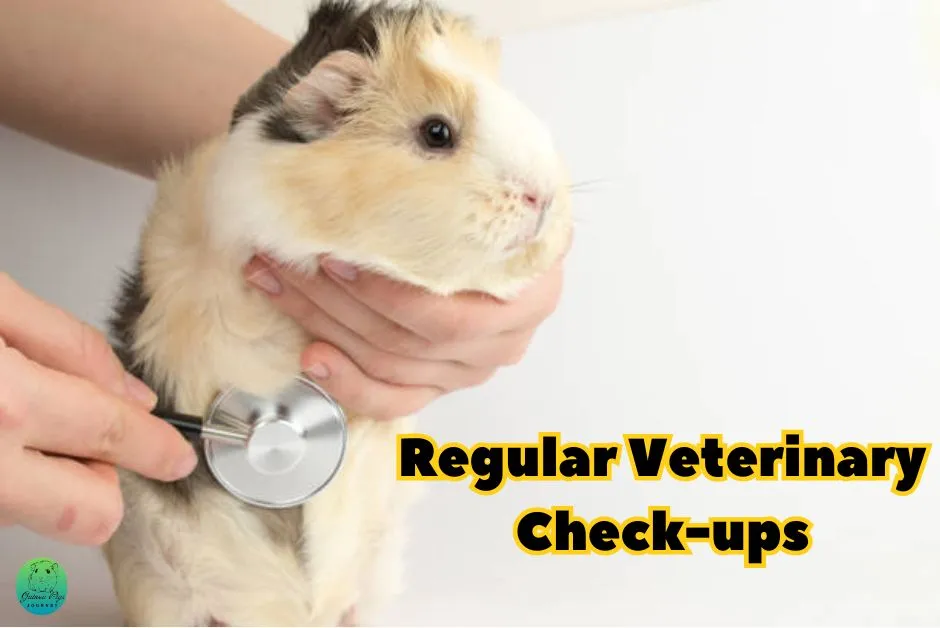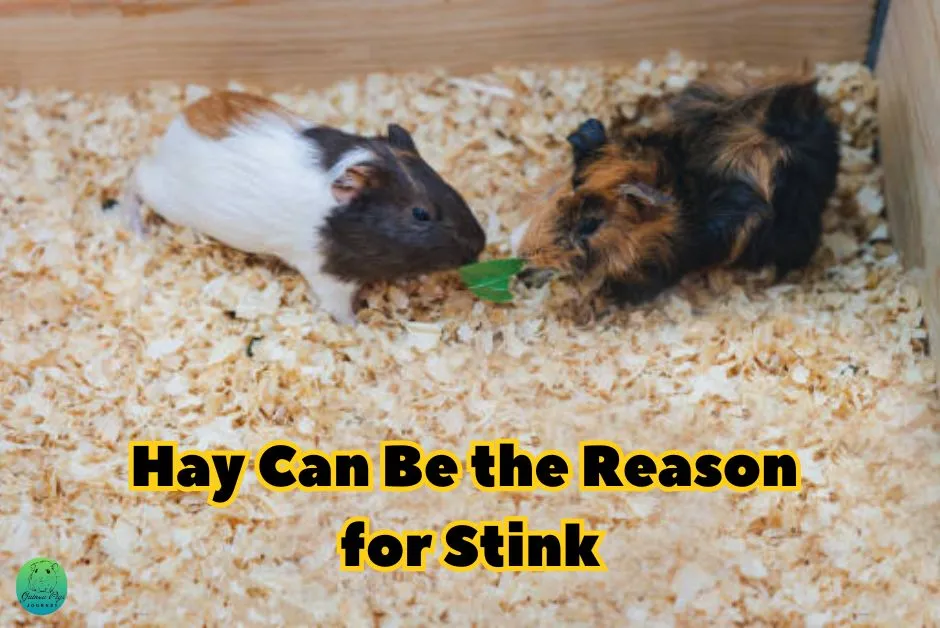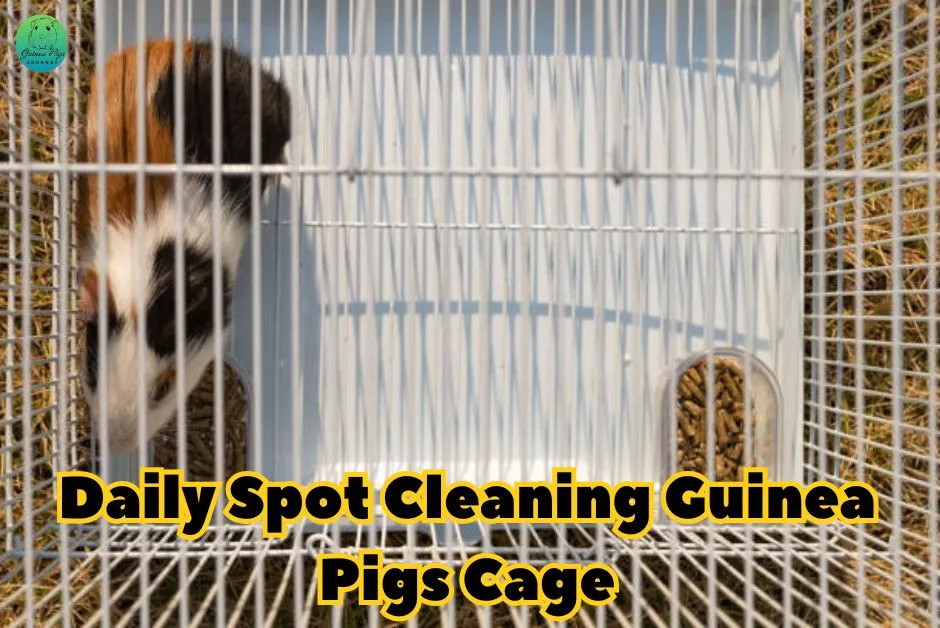Of course not, Guinea pigs do not smell as they are cute creatures. Guinea pigs themselves do not inherently have a strong smell. You would be happy to know that guinea pigs groom themselves and are relatively clean animals overall. One of the experiences I gained from this long guinea pig journey with my little friends is guinea pigs secrete fluid from their eyes to clean their faces. When they are healthy and kept in a clean environment, they typically do not produce any bad odors.
Various factors can influence the smell associated with guinea pigs, primarily related to their care and living conditions. However, like other pets (and even people), guinea pigs will produce a smell if they are kept in dirty conditions and fed the wrong foods. Still wondering do guinea pigs smell? Let’s thoroughly understand the query.
Here you can also read 12 Best Tips For How To Make Your Guinea Pig Love You Again and address their dominance issue.
Why Guinea Pigs Smell And Factors Influencing The Smell?
As already mentioned, Guinea pigs are groomed and very intelligent pets they are clean and odorless animals and do not usually give off an unpleasant smell. But when a guinea pig’s environment is not maintained and looked after correctly, or they are fed the wrong foods, and their cage or bedding is not changed frequently, these little pocket pets can quickly stink up your room.
When a guinea pig is first brought home, one of the most crucial things it gets used to is all the new smells within the home to get the answer for do guinea pigs smell. Here are some of the main factors that may influence the smell and ultimately cause guinea pigs to stink:
Diet and Digestion:
The food guinea pigs eat plays a significant role in determining their smell. If guinea pigs are fed inappropriate foods, such as those high in sugar or with strong odors, this can affect the smell of their urine and feces, leading to a more noticeable odor. However, a diet rich in fresh vegetables, hay, and specially formulated guinea pig pellets usually results in minimal odor.
Health:
A healthy guinea pig is less likely to produce bad smells. Various health issues, such as dental problems, respiratory infections, or digestive disorders, can cause a guinea pig to emit unpleasant odors. Schedule Regular Veterinary Check-ups and visits to the nearest vet to ensure your guinea pig is healthy and maintains a healthy lifestyle and weight to avoid stinking up the cage and house.

Cleanliness of Habitat:
The most crucial factor in preventing bad smells is maintaining a clean living environment. Guinea pigs produce a considerable amount of waste, and if their cage is not cleaned regularly, the accumulation of urine and feces can lead to strong, unpleasant smells. A clean cage, with fresh bedding and regular removal of waste, significantly minimizes stinking up the house.
Hay Can Be the Reason for Stink:
Good and fresh quality hay makes up 80-90 % of most of your guinea pigs’ diet if kept in a safe place. However, if hay is kept loose and out in the open, this can have a distinct smell due to the dust, fungus, and bacteria spoiling the hay which can be very dangerous for guinea pigs’ health as well especially the lungs. Spot cleaning daily their cage and vacuuming up the dust as well as keeping the hay in a safe and protected environment can be quite the task, and traditional hay racks can still harbor some dust as well.

Type of Bedding:
The choice of bedding material also impacts odor control. Some bedding materials are better at absorbing urine and controlling odor than others. For example, paper-based bedding or aspen shavings are more effective at odor control compared to pine or cedar shavings, which can also be harmful to guinea pigs. When choosing to bed for your guinea pig cage, you must get a good quality product that is super-absorbent, comfortable, odor-resistant, and non-toxic.
Daily or Weekly Deep Cleaning:
It is very important to clean the bedding and cage of your guinea pig. However, if not daily then once a week, you being a responsible owner must remove all bedding, clean the cage with a pet-safe disinfectant, and replace it with fresh bedding.
Grooming:

One of the other important reasons why guinea pigs may smell include illness and poor grooming. After all, they regularly groom and clean themselves. However, what you are smelling is soiled or wet bedding, poop, and wee and uneaten food. Brush your guinea pigs’ hairs regularly to remove loose fur and prevent matting, especially if they have long hair.
How to Reduce or Avoid Stinking Up Guinea Pigs?

Change The Bedding Regularly:
If you have multiple guinea pigs then the cage with multiple guinea pigs will need to have the bedding replaced more often than a cage with just one or two. On average, however, we recommend changing it every two to three days to keep and maintain a good and healthy environment that would avoid stinking up the house and cage.
Daily Spot Cleaning Guinea Pigs Cage:

If your guinea pigs poop and pee a lot you must do a spot clean every day to get rid of piggy poop, soiled bedding, and any leftover food to reduce odors from their cage. Keep the cage clean with daily spot cleaning and weekly deep cleaning will keep your furry friend’s cage smelling fresher for longer.
Guinea pigs are very vulnerable and easily get into infections, whether it be upper respiratory infections, fungal infections, or urinary tract infections. The best way to prevent those, and prevent worsening them if your guinea pig already has these infections, is to make sure their cage and overall living environment are as clean and as safe as they can be in the first place.
Ventilation:
Proper ventilation in the room where the guinea pig’s cage is located is crucial. Good airflow helps to disperse any smells and keeps the environment fresh. Use fans or open windows to improve air circulation.
Location:
One of the main ways to avoid smell from your home or room is the location of your guinea pig’s cage you have placed in the room. If you feel any smell you may place the cage in a well-ventilated area, away from direct sunlight and drafts to avoid the smell.
What to Feed Your Guinea Pigs to Avoid Smell?

The list of safe foods and other herbs, leafy greens, veggies, fruits, etc. that can be fed to guinea pigs is so long that needs great care to know the best way of feeding guinea pigs. But not all foods your guinea pigs eat are safe, like jalapenos peppers, pickles, cheerios, olives, meat, etc.; some are toxic and harmful to their health and digestive system and can produce a very bad smell in your home. So, you must also know about those foods not recommended to feed guinea pigs for their safe and healthy life.
In general, Guinea pigs require good and fresh quality hay which makes up 80-90 % of most of their diet along with 10 % of fresh and good quality fruits, leafy greens, and vegetables such as sugar snap peas, broccoli, Swiss chard, asparagus, arugula, dandelions, pears, honeydew melon, pomegranate, cherries, plums, etc. as a treat in moderation so that you can manage the quantity of food to avoid producing bad smell from guinea pigs.
Guinea pigs can also be served with some amount of only dedicated guinea pig pallets but it should not be part of their main staple and regular diet which should be served the recommended portion or mentioned on pallets bag for guinea pigs. Guinea pigs should also be served with fresh, clean, chlorine-free drinking water at all times and must be checked and changed twice a day for their good health.
Do Guinea Pigs Smell Your Room?
If you are considering getting a guinea pig for yourself, then you must be wondering if they make your house smell. The answer is that all pets come with unique and distinctive smells which depend on many factors influencing smell which may include their diet, the bedding you use, how you groom your guinea pigs, how frequently you clean their cage, and their habitat. So, inherently guinea pigs do not smell, but you are the one being a good owner to keep them clean and smell good.
Real Experiences About Guinea Pigs Stinking:

As far as my guinea pigs are concerned this guinea pig journey taught me about the best care and maintenance for these little furry friends to avoid stinking up. Some other pet owners often share their experiences online, and many report that guinea pigs do not smell if their cages are kept clean and they are fed a proper diet. For example, one pet owner noted that their guinea pigs only smelled when they neglected to clean the cage for a week due to a busy schedule. Another mentioned that switching to paper-based bedding significantly reduced any noticeable odor.
Conclusion:
The bottom line is guinea pigs do not inherently smell! The key to keeping them odor-free is regular cage cleaning, proper bedding, a balanced diet, best grooming, and maintaining their health. By following these best practices, guinea pig owners can ensure that their pets remain clean and their living environment stays fresh. Potential guinea pig owners can feel confident that with the right care, these delightful pets will not cause unpleasant stinks in their homes.
Ultimately, the concern that guinea pigs will stink up your house is largely unfounded if you commit to proper care and hygiene. Prospective guinea pig owners can rest assured that with the right approach, these charming pets will not only bring joy and companionship but will also maintain a pleasant living environment.
Frequently Asked Questions: FAQs
Q: How often should I clean my guinea pig’s cage?
A: Spot-clean the cage daily by removing soiled bedding and feces. Perform a deep clean once a week, including changing all bedding and disinfecting the cage.
Q: What type of bedding is best for controlling odor?
A: Paper-based bedding, fleece liners, and aspen shavings are excellent choices for controlling odor. Avoid cedar and pine shavings as they can be harmful and do not absorb odors well.
Q: Can diet affect how my guinea pig smells?
A: Yes, a balanced diet of hay, fresh vegetables, and pellets helps maintain a healthy digestive system and minimizes odor. Avoid foods that can cause digestive issues or produce strong-smelling waste. Feed them in moderation can also reduce the chances of stink from your guinea pigs.
Q: Is it safe to use air fresheners around my guinea pig’s cage?
A: No, air fresheners can be harmful to guinea pigs as they may be allergic to them or cause breathing problems for them. It is better to maintain a clean cage and ensure proper ventilation to control odors.
Q: Do guinea pigs need baths to stay clean?
A: Guinea pigs do not usually need baths and can be anxious by them. Regular brushing and spot cleaning are typically sufficient to keep them clean. Only bathe them if recommended by a vet for medical reasons.







